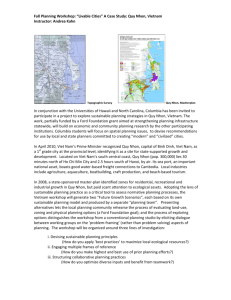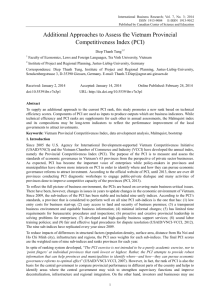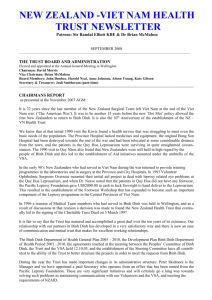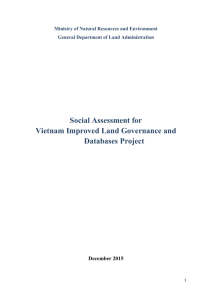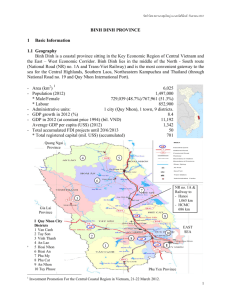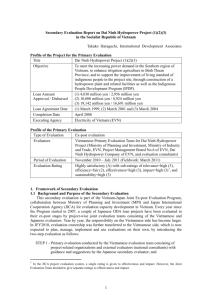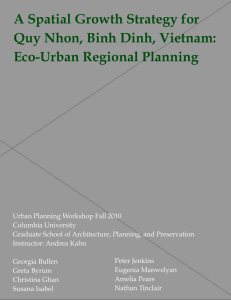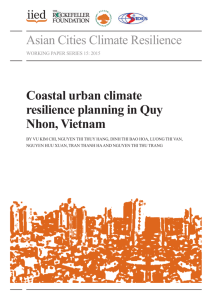extreme cities
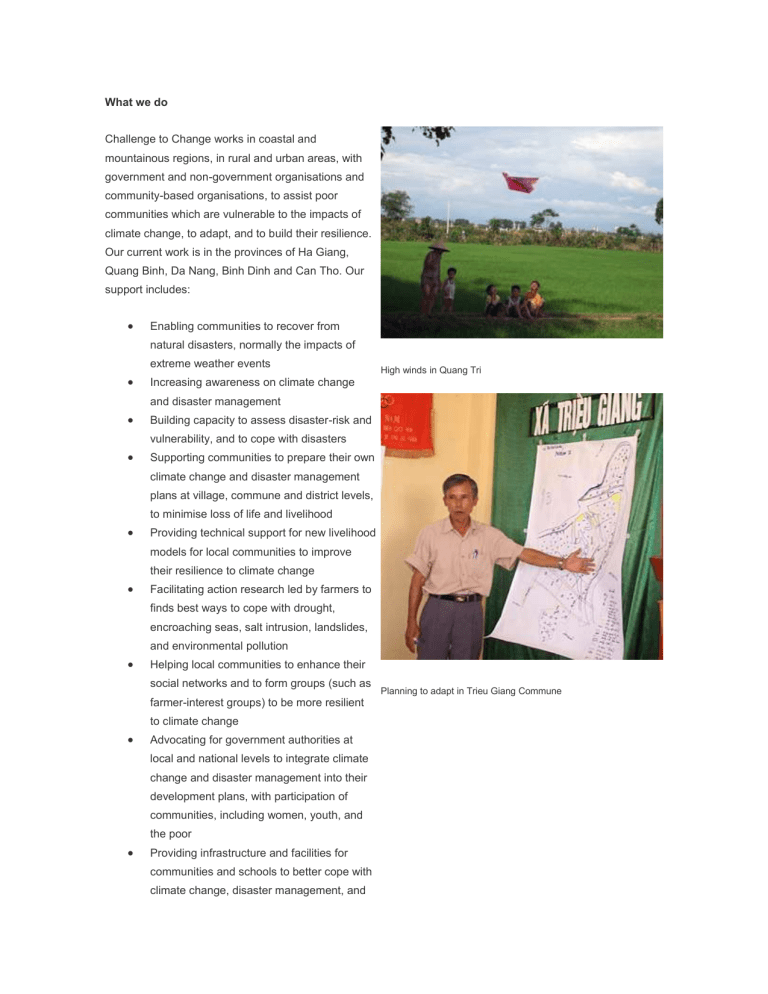
What we do
Challenge to Change works in coastal and mountainous regions, in rural and urban areas, with government and non-government organisations and community-based organisations, to assist poor communities which are vulnerable to the impacts of climate change, to adapt, and to build their resilience.
Our current work is in the provinces of Ha Giang,
Quang Binh, Da Nang, Binh Dinh and Can Tho. Our support includes:
Enabling communities to recover from natural disasters, normally the impacts of extreme weather events
Increasing awareness on climate change and disaster management
Building capacity to assess disaster-risk and
High winds in Quang Tri vulnerability, and to cope with disasters
Supporting communities to prepare their own climate change and disaster management plans at village, commune and district levels, to minimise loss of life and livelihood
Providing technical support for new livelihood models for local communities to improve their resilience to climate change
Facilitating action research led by farmers to finds best ways to cope with drought, encroaching seas, salt intrusion, landslides, and environmental pollution
Helping local communities to enhance their social networks and to form groups (such as
Planning to adapt in Trieu Giang Commune farmer-interest groups) to be more resilient to climate change
Advocating for government authorities at local and national levels to integrate climate change and disaster management into their development plans, with participation of communities, including women, youth, and the poor
Providing infrastructure and facilities for communities and schools to better cope with climate change, disaster management, and
related clearn water and sanitation issues
Building capacity for civil society organisations and local community-based organisations on project management especially for climate change-related projects
Linking Vietnam with international expertise on climate change, through research and workshops
Enabling Youth to raise their voice and participate in decisions regarding adaptation
to, and mitigation of climate change, because Youth are the main stakeholders of the future
Promoting knowledge, values and behaviour which minimise the environmental and carbon footprint of development activities
Supporting teachers and students to increase their understanding of climate change, its nature, causes, and effects on their daily lives
Cities
Approximately 31% of Vietnamese population live in cities, and this is due to rise to 45% by 2025. The rapid growth of Vietnamese cities brings increasing urban poverty, and risks of disaster caused by extreme weather events. As part of the Asian Cities
Climate Change Resilience Network, funded by the
Rockefeller Foundation, Challenge to Change works with poor communities, and with local government, and with Youth groups in three cities
– Quy Nhon, Da
Nang and Can Tho. These cities are vulnerable to typhoons, floods, tidal surges and riverbank erosion, and local livelihoods are partly dependent on nearby agricultural production, which is affected by increasing soil salinity as the sea encroaches from year to year. Past support has included participatory assessments of hazards, capacities and vulnerabilities across the cities, and support to experimental projects, for example a winch system to pull fishing boats ashore before typhoons
hit , adapted models of construction of safer housing for vulnerable households, and clean water supply in a remote area of Can Tho using solar-powered electricity supply for the water pumps. Future activities may include improving water and waste management systems, mainstreaming climate change into city planning, improving the capacity of local health services to cope with climate-related health issues, restoring and protecting ecological systems, and enabling poor households to have more diverse, adaptable livelihoods options.
Youth
Challenge to Change gives priority to Youth, supporting them in all our project areas – Ha Giang,
Quang Binh, Can Tho, Da Nang, Quy Nhon, and
Hanoi. Youth are the social group with the greatest concern for future sustainability. They are also possibly the most able and motivated to address climate change and sustainability issues. Yet they are marginalised from official decision-making processes.
CtC supports Youth Forums, where Youth initiatives are showcased and Youth action plans are developed. CtC works with local government to improve levels of participation of Youth representatives in local decision-making. We raise funds for, and support Youth Action Plans for building local resilience to climate change, and for ‘Green
Living’ (sustainability) actions.
Awareness and Behaviour Change (ABC)
Sustainability can only be achieved through changes in human behaviour. Behaviour change can be achieved in many ways, including through raising awareness, and influencing human values, and by increases in responsible legislation to regulate human exploitation and consumption of natural resources. A useful typology of behaviour change techniques can be downloaded here.
Challenge to Change advocates for all types of good change in human
behaviour, and supports a range of awareness-raising and behaviour change initiatives in Vietnam and also in the UK. In Vietnam, CtC is active within the
Climate Change Working Group (CCWG) among
International NGOs, and also in the ABC
Subgroup. In the UK, CtC is a member of the Stop
Climate Chaos Coalition, a group of civil society organisations which advocates for change in government policy and for reductions in carbon emissions. We promote re-use, reduce and recycling, and community-based initiatives where responsibilities for environmental care are shared. We follow developments in technology which may lead to breakthroughs in the reduction of our environmental footprint, and we engage in development education with local community groups.
Currently our key partners include :
Caritas Switzerland is an
International NGO supporting poor communities in Vietnam since the mid-1990s. In 2010 Caritas is increasing its focus on Disaster
Risk Reduction and Climate
Change Adaptation, and is working closely with Challenge to
Change in Quang Binh Province, supporting communities to recover from extreme weather events on the coast.
Plan International is an
International NGO working with ethnic minority communities in Ha
Giang Province, one of the poorest areas of Vietnam in the remote northern mountainous region. Together, Plan and
Challenge to Change are supporting Ha Giang local government to plan its response to climate change, with special
consideration for women and for the poor.
The Institute for Social &
Environmental Transition (ISET) is an international organisation with offices in the United States and
Nepal, with academic and practical expertise in bridging climate science and adaptive responses to climate change. ISET is establishing its work in Vietnam, and works in partnership with Challenge to
Change in Da Nang, Quy Nhon and Can Tho cities.
The Rockefeller Foundation is a philanthropic institution seeking to address the underlying causes of human suffering. Rockefeller initiated the Asian Cities Climate
Change Resilience Network in
Vietnam, and is also working on climate change programmes in
Africa in relation to agriculture, and the United States in relation to policy, and is supporting the CtC
Youth Programme in Vietnam.
The Worldwide Fund for Nature initiated Earth Hour several years ago. Challenge to Change is working in cooperation with WWF to carry out activities within the
‘Earth Hour 60+’ programme, in
Hanoi, with the aim of ‘going further’ than simply turning off the lights for one hour. ‘Earth Hour
60+’ aims to generate broader initiatives towards global sustainability.
The People’s Aid Coordination
Committee (PACCOM) was established in 1989 under the
Vietnam Union of Friendship
Organizations at central level. PACCOM facilitates humanitarian and development aid activities of International NGOs working in Vietnam, and works in partnership with International
NGOs to host a Resource Centre in Hanoi.
CtC’s local government partners within Vietnam are the Provincial
People's Committees of Ha Giang,
Da Nang, Binh Dinh, Quang Binh and Can Tho, and their technical departments such as the
Departments of Natural
Resources & Environment, and the Peoples Committees at lower levels (District and
Ward/Commune). CtC works in full cooperation with local government.
The Association for Empowerment of People with Disabilities is a
Vietnamese NGO based in Quang
Binh Province. It emerged from the International NGO, the
Landmines Survivors
Network. Challenge to Change works with AEPD and with Caritas in Quang Binh Province to support recovery of vulnerable communities from extreme weather events.
In addition to support to vulnerable communities,
Challenge to Change carries out research and
consulting assignments on climate change-related issues for local government and other international development agencies in Asia.
In the UK we campaign against over-consumption and degradation of the environment. We join other development agencies to engage in policy dialogue with our government to make the transition to renewable energy and to take action to halt climate change. We promote re-use, reduce and recycling. We support community-based initiatives where responsibilities for environmental care are shared. We follow developments in technology which may lead to breakthroughs in ecological balance, and we engage in development education with local community groups.

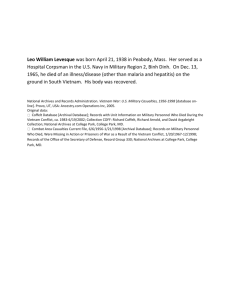
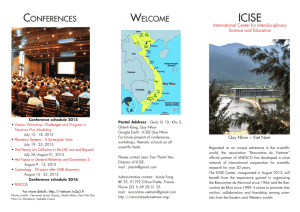

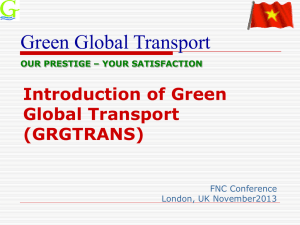


![vietnam[1].](http://s2.studylib.net/store/data/005329784_1-42b2e9fc4f7c73463c31fd4de82c4fa3-300x300.png)


